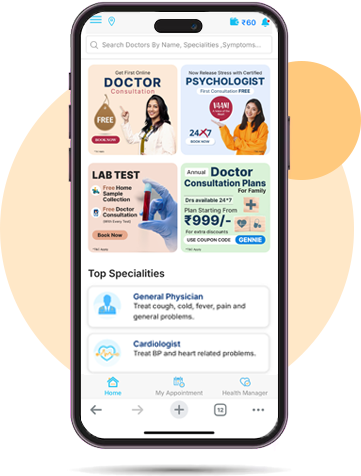Do Your Elders Face Gas Problems? Here's a Guide on Gastric Issues in Elderly People
February 25 , 2023

The primary sign of aging is the gradual loss of physiological integrity, which results in dysfunction and increased mortality risk. However, as life expectancy rises, this cut-off point may get raised in the years to come. Currently, the old population is those over 65. The GIS is the impact of side effects and is also crucial for the absorption and metabolism of medications.
Certain diseases are more common in this age group and may require specialized therapy, even if there are no specific GI diseases limited to old age. So, the emphasis is to highlight the most prevalent diseases that affect the elderly while stressing the specifics of clinical presentation and care if they considerably differ from the younger group. The main emphasis is on age-related pathophysiology and clinical implications in the elderly with our best gastroenterologists in Jaipur. Let's go down the road to becoming familiar with most gastrointestinal diseases in old age.
Difficulty in Swallowing Food
Dysphagia is another word for difficulty or discomfort in swallowing. From mild pain to severe agony, symptoms can range. The barium swallow test is the most typical way to diagnose. Surgery may be required, though it is not usually necessary, to minimize the obstruction. As advised by best doctor for gastroenterology in Jaipur give your loved one modest, frequent meals of softer foods with great nutritional value to assist in the treatment of dysphagia. To promote digestion, make sure your loved one eats while sitting upright.
Stomach Itching or Acidity
Heartburn and other uncomfortable sensations are caused by GERD when stomach acid rises into the esophagus. Eating too late at night, consuming foods like fried, spicy, or fast food, and taking some medications are a few things that might induce reflux. Eating well and exercising is crucial for senior health because obesity raises the risk of GERD. If your loved one requires assistance with healthy routines, hire a professional caretaker. Caregiving for an elderly loved one can occasionally become too much for some families. Fortunately, they can rely on qualified care.
Small Pouches on Your Intestine
Diverticula are small pouches that emerge from the colon and intestinal wall lining. Bloating, gas, cramping, and constipation can occur, though these typically go unreported. Diverticula can leave scars and cause anomalies, although they do not harm anyone or require medical attention. When it becomes inflamed, the ailment is known as diverticulitis. Symptoms include fever, nausea, vomiting, cramping, and stomach pain. These therapies include the use of antibiotics, analgesics, and liquid diets. Older patients should refrain from utilizing laxatives and enemas during their treatment.
Pain in Your Stomach
The main organ impacted by IBS is the large intestine. Among its frequent adverse effects are bloating, gas, cramps, stomach pain, diarrhoea, and constipation. IBS can be brought on by stress, specific foods, and drugs. The conventional treatment plans involve increasing fibre consumption while reducing caffeine, trigger foods, and stress. Prescription drugs are sometimes required. A competent carer will see that your loved one eats healthily and lives in better quality. Seniors can benefit in many ways from receiving professional elder care, especially if they want to age in good health. The objective is to support your loved one in doing daily tasks, preventing disease, and focusing on leading a healthier and more fulfilling life.
Infrequent Bowel Movements
Seniors frequently have constipation. The digestive systems of ageing humans alter. Moreover, bowel movements may be infrequent or uncomfortable, and stools may be hard and dry. Constipation may be a symptom of another condition or be brought on by the side effects of a medicine. To rule out additional issues, it is generally appropriate to seek guidance from the Top 10 Gastroenterologists in Rajasthan when constipation occurs.
Learn How to Prevent Digestive Diseases With Us
Have Meals Frequently
When you consume a huge meal, your digestive system is overloaded. It can also no longer be in the position to take care of meals as nicely as it should. It can motivate heartburn from acids going again from the belly into the esophagus. Such belly overload might also set off gas, nausea, or vomiting.
Aiming to eat 5 to six mini-meals a day can promote typical excellent digestive health. Make sure you consume a combination of carbs, protein, and heart-healthy fats at every meal. Take an example of peanut butter on whole-wheat crackers, a tuna sandwich, or yogurt with fruit. You ought to additionally keep away from mendacity down after eating. It will increase the hazard of heartburn and nausea.
Eat More Fibers
The Mayo Clinic suggests an average daily fiber intake of 25 grams for women in the same age range and 38 grams for males under 50. People over 50 want just a little less fiber, at 30 grams for men and 21 for women each day. To prevent digestive issues, balance the system by getting enough fiber. Try and browse through your kitchen for all the fibers to get in your body for a healthy lifestyle.
Drink Plenty of Water
Water aids your digestive health by assisting in cleansing the whole system. It is particularly beneficial in stopping constipation as water helps soften your stools. Furthermore, water may also assist your digestive system in absorbing vitamins extra efficiently with the help of the physique to break down food.
Aim to drink eight glasses of water every day and ignore the sugary drinks. Added sugars can make digestion issues worse.
Conclusion
Digestive problems are selectively hard for seniors, and it may be difficult for family caregivers to figure out how to care for a loved one suffering from gastrointestinal distress. Caring for an elderly loved one can be difficult for families without expertise or professional training in home care, but it is not necessary to take up this challenge alone. At Health Gennie, we bring our best gastroenterologists to solve all your stomach problems with great expertise and finesse. For a healthy stomach, beware of what to do and how to do it.
Disclaimer:
The information on this blog is not a substitute for any professional medical diagnosis or treatment. The blog contains text, images or graphics are solely for informational purpose. Before implementing the information mentioned above, seek the advice of a professional doctor regarding any doubt or question you may have about the medical condition or treatment. Also, take the advice of a professional health care provider before making changes in your health care routine.











